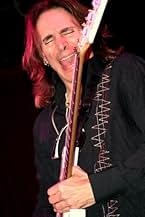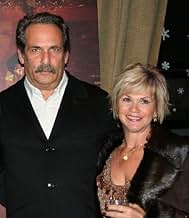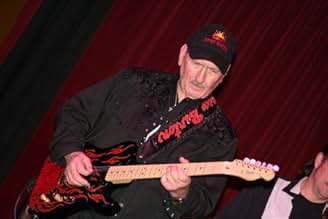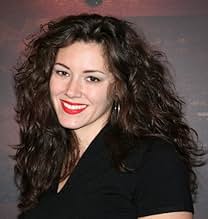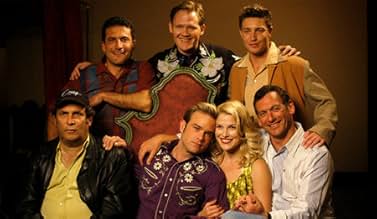Inspired by the life of Hank Garland, CRAZY is the story of a legendary guitar player who emerged from Nashville in the 1950's.Inspired by the life of Hank Garland, CRAZY is the story of a legendary guitar player who emerged from Nashville in the 1950's.Inspired by the life of Hank Garland, CRAZY is the story of a legendary guitar player who emerged from Nashville in the 1950's.
- Awards
- 16 wins total
Timothy Omundson
- Paul Howard
- (as Tim Omundson)
- Director
- Writers
- All cast & crew
- Production, box office & more at IMDbPro
Featured reviews
I recently saw Crazy at the Hoboken Film Festival and was blown away by every aspect of the movie. Not knowing anything about the life of Hank Garland I was captivated from the opening scene to the very end. The movie is extremely well written and well cast. The actors have their characters down pat and give very believable performances, especially Waylon Payne as Hank. Director Rick Bieber's technique of filling the screen with his characters' faces completely draws you in, and Ali Larter has never looked more beautiful. I can't wait to see it on a big theatrical screen. If you like music of any kind you'll find this film fascinating.
Wanted this movie to better, felt more like 'The Real World' than 'Walk the Line'. anti climactic and confusing in places, underdeveloped character re pore. important story lines disregarded in place of empty dialog. issues of race as well as alcoholism thrown into the forefront briefly with little or no precedent set earlier in the film. solid acting lost due to wavering plot lines and lack of character development save that of Hank Garland. seemingly contrived movie title, this movie often feigns at an 'Aviator' like tragedy when in reality comes closer to that of an 'A.I.' with a melancholy and somewhat abrupt ending. carried by performance of main character Hank Garland (Waylon Payne), whose performance just might be worth the price of admission.
When I hear what passes for music in businesses and in movies and TV, I wonder if there is any hope. Then I watch a movie like this. All of the music is so good! The worst song is "Jingle Bell Rock", and that's only because I want my Christmas music very traditional.
It's hard to believe a bad boy like Hank Garland can play the guitar in such a mellow style. Of course, he can do rock and roll, too, which is what someone like him would be expected to. But it's the good kind. And he seems happiest when he is playing.
And then there is Wes Montgomery. Such a nice, pleasant jazz sound. As portrayed by Tony MacAlpine, he looks like he's mad at someone, or at the very least you don't want to mess with him. But he and his other musicians do easy listening right, with sort of an attitude to keep it from being boring.
Nice restaurants also have a pleasant but more generic jazz sound.
Mandy Barnett as Patsy Cline (who, ironically, is never shown singing the title song) and Shawn Colvin as Kitty Wells (I did not know who she was supposed to be) give great performances. They never speak lines, but that's not important.
Jason Alan Smith as Elvis was a disappointment. He never speaks, but he has that trademark sneer on "Amazing Grace", which goes against the image of Elvis showing respect while singing gospel music.
But this is more than just great music. Hank Garland starts out as a clean-cut kid, but later on as a respected backup performer, he has enough money to get what he wants, and manages to be charming with the women he can get, though men better not make him mad. All he seems to know how to do when angered is punch somebody. Fortunately for Evelyn, it's never her. Though once she is married to him, he tells her he cares and never manages to show it. His career is his first priority. There are women, but of course they don't mean anything--right? Garland does love their daughter, but he's hardly ever around. Nevertheless, Evelyn "stands by her man", but she does have needs.
And while he claims to have co-written "Jingle Bell Rock", despite what the movie's credits say, he must deal with a system that makes him choose between being a performer and a writer. Garland wants to be both.
And the people who don't want Garland going against the system can do more than just punch Garland's lights out.
While much of the movie other than the music is unpleasant to watch, the acting performances are good. Ali Larter showed obvious concern, for example, when she noticed another woman looking at her husband.
There's a reason for the movie's title (other than the Patsy Cline song that is limited to the closing credits) which I will only say is revealed in the first scene. Other than that, I feel I would be giving away too much. I have to wonder why "Sugarfoot" was not used as a title, since two songs with this name are Garland's trademarks, and this becomes a nickname.
The movie deals with racism. Country/rock performer Garland discovers jazz and dares to enter an all-black club where the music is played. He is seen as an outsider, but once he starts playing that kind of music, this is no longer the case. But having a "colored man" in his group backfires once he returns to the South. Hotels won't welcome the man, and Evelyn claims she is trying to raise their daughter with the right values and can't have the likes of him around her.
It's worth seeing, for the music if nothing else. Just remember Hank Garland went through so much misery to make us so happy.
It's hard to believe a bad boy like Hank Garland can play the guitar in such a mellow style. Of course, he can do rock and roll, too, which is what someone like him would be expected to. But it's the good kind. And he seems happiest when he is playing.
And then there is Wes Montgomery. Such a nice, pleasant jazz sound. As portrayed by Tony MacAlpine, he looks like he's mad at someone, or at the very least you don't want to mess with him. But he and his other musicians do easy listening right, with sort of an attitude to keep it from being boring.
Nice restaurants also have a pleasant but more generic jazz sound.
Mandy Barnett as Patsy Cline (who, ironically, is never shown singing the title song) and Shawn Colvin as Kitty Wells (I did not know who she was supposed to be) give great performances. They never speak lines, but that's not important.
Jason Alan Smith as Elvis was a disappointment. He never speaks, but he has that trademark sneer on "Amazing Grace", which goes against the image of Elvis showing respect while singing gospel music.
But this is more than just great music. Hank Garland starts out as a clean-cut kid, but later on as a respected backup performer, he has enough money to get what he wants, and manages to be charming with the women he can get, though men better not make him mad. All he seems to know how to do when angered is punch somebody. Fortunately for Evelyn, it's never her. Though once she is married to him, he tells her he cares and never manages to show it. His career is his first priority. There are women, but of course they don't mean anything--right? Garland does love their daughter, but he's hardly ever around. Nevertheless, Evelyn "stands by her man", but she does have needs.
And while he claims to have co-written "Jingle Bell Rock", despite what the movie's credits say, he must deal with a system that makes him choose between being a performer and a writer. Garland wants to be both.
And the people who don't want Garland going against the system can do more than just punch Garland's lights out.
While much of the movie other than the music is unpleasant to watch, the acting performances are good. Ali Larter showed obvious concern, for example, when she noticed another woman looking at her husband.
There's a reason for the movie's title (other than the Patsy Cline song that is limited to the closing credits) which I will only say is revealed in the first scene. Other than that, I feel I would be giving away too much. I have to wonder why "Sugarfoot" was not used as a title, since two songs with this name are Garland's trademarks, and this becomes a nickname.
The movie deals with racism. Country/rock performer Garland discovers jazz and dares to enter an all-black club where the music is played. He is seen as an outsider, but once he starts playing that kind of music, this is no longer the case. But having a "colored man" in his group backfires once he returns to the South. Hotels won't welcome the man, and Evelyn claims she is trying to raise their daughter with the right values and can't have the likes of him around her.
It's worth seeing, for the music if nothing else. Just remember Hank Garland went through so much misery to make us so happy.
Well grounded picture showing the talent of a great guitar player, plagued by the racist unions of America. But he fought on until he gave out.
In Hawaii where the residents truly value guitar talent and a good story, Crazy did not leave the 2008 Big Island Film Festival audiences disappointed. Although the Hawaiian guitar music is slack key style, the audiences appreciated the tumultuous story of Hank Garland's Nashville career. Under the stars, both residents and visitors enjoyed the story, the performance of Waylon, the technical quality of the films and the music of the era. Many commented on how much the music of Crazy was tied to the music of their parents. Many also asked when Crazy was coming to the theaters, so they could see it again and share it with their friends. It was a hit at Big Island Film Festival and won the Golden Honu Award for Best Feature. We are looking forward to Ric Bieber's next film.
Did you know
- TriviaEpilogue: "Hank did return to the Opry stage in 1978 for one final performance. He passed away two weeks before we began production at the age of 74, leaving behind family, friends and admirers who loved him come, and remain inspired by his music. We dedicate this film to his memory."
- GoofsAt the beginning of the movie Goldie Hill is singing "Honky Tonk Blues" in 1945. The song was originally recorded by Hank Williams in 1952, seven years after the scene was to have taken place.
- Crazy creditsPhotos of Hank on stage, his wife Evelyn, and with celebrities along with a video of him guitar are shown during end credits.
- ConnectionsReferences The Eddy Arnold Show (1956)
- SoundtracksOpening Riff
Written by Larry Klein
- How long is Crazy?Powered by Alexa
Details
- Release date
- Country of origin
- Official sites
- Language
- Also known as
- The Hank Garland Story
- Filming locations
- Agoura Hills, California, USA(Paramount Ranch)
- Production company
- See more company credits at IMDbPro
Contribute to this page
Suggest an edit or add missing content


